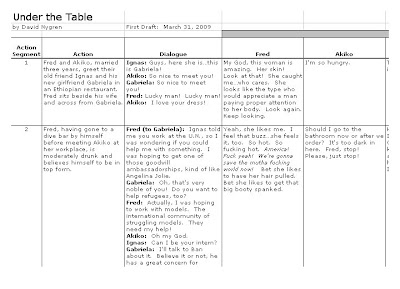
Click on the illustration for a larger, more legible version.
A short storyspreadsheet? Why not?
A blogger and fiction writer named David Nygren has come up with a groundbreaking new literary form, a brief narrative contained entirely within a Microsoft Excel spreadsheet. It could revolutionize American literature, or at least save it from going under with General Motors.
The spreadsheet of "Under the Table," a one-scene tale of a boozy dinner, with lots of groping, in an Ethiopian restaurant is set up across 8 columns and 30 rows.
The concept is deceptively simple. Column A denotes the number of the "action" point in time. Column B contains the action itself. Column C shows the dialogue among the characters. Columns D through H are filled with the internal thoughts of each character.
The illustration of part of the spreadsheet above will give you an idea, but if you have any Excel skills (all you need to know is how to scroll across and down a spreadsheet) it's better to download the "short spreadsheetstory" from Nygren's blogpost and examine it. (Excel isn't on my Macs, but OpenOffice displayed the piece just fine.)
You can read it in the usual Western European manner, from left to right, then back to Column A and down to Row 2, then from left to right and so on. Or you could adopt the method of Hebrew and Arabic and read from right to left. Another method is to read Column A all the way down, then return to the top and start down again on Column B. Maybe you want the thoughts of the characters before they speak their words and execute the action? You could read the story that way.
A truly innovative literary device is a graph showing "character intensity thought units," which would have delighted Samuel Beckett and James Joyce.
It is a deep and profound upheaval of all we were taught in American Literature 101, resonant with meaning and implication. The world will never be the same.
Nygren may have single-handedly saved the U.S. publishing industry. Can you imagine what creative souls might do with the rest of Microsoft Office? We could have brilliant PowerPoint poetry, Access biography, Outlook e-mail mysteries and so on.
With deep thanks to Mediabistro.com.

April's Fool, right ;-)?
ReplyDeleteWho . . . ME? The very idea!
ReplyDelete